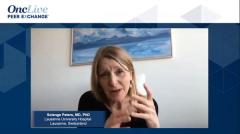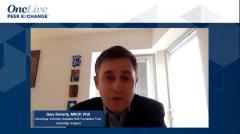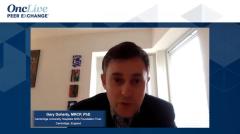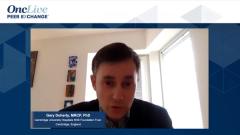
Combination Regimens for Metastatic EGFR-Mutated NSCLC
Expert thought leaders in thoracic oncology share their experiences with EGFR-TKI combination strategies in patients with EGFR-mutated metastatic NSCLC.
Episodes in this series

Neal Navani, MRCP, MSc, PhD: Christian, let me come to you about the role of TKIs [tyrosine kinase inhibitors] in advanced EGFR-mutated non–small cell lung cancer. We all accept that our first-line TKIs act as the standard of care. How are we going to progress with that? What about combinations? What data do we have out there? For example, a combination of EGFR, TKI, and chemotherapy. Do you see that being used in clinical practice in the future?
Christian Grohé, MD: First, what we have to discuss is that, at the moment, the standard of care in the first line in the majority of our settings is osimertinib. For patients who had first- or second-line TKIs like afatinib, followed by osimertinib—we know that the combination of osimertinib plus, for instance, an antiangiogenic drug, doesn’t have any major benefit for these patients. First- or second-line TKIs followed by a third-line TKI will not be more successful overall if combined with an antiangiogenic drug. For patients who fail after first-line osimertinib, we still must discuss what data we have now, after failure. We try to rebiopsy—at least the patients who are at our institution [Evangelical Lung Cancer Hospital]—and understand the off/on target resistance pattern. If we don’t have a classically timed approach to have this patient approved for clinical trials, we consider giving chemotherapy. Then the question is, do we use the standard of care: platinum-based, pemetrexed-based chemotherapy? Or do we go with a protocol based on IMpower150?
Overall, IMpower150 doesn’t play a major role, at least at any institution I’m aware of in our country. For some patients we use this. We’ve used that for patients who have multisite progression, and in particular, for patients with liver metastases, with some benefit. For patients who have oligometastatic disease, or leptomeningeal disease in particular, we don’t consider having a broad approach of quadruple therapy to be of benefit for these patients. This is a large unmet need. We have long-term survivors. We must understand what’s going on. For that reason, we try to implement a rebiopsy, either from a sample tumor site or a liquid biopsy, to understand the pattern of recurrence or pattern of resistance after those osimertinib failures. From our data from the liquid biopsy, we understand that the overall pattern of resistance after osimertinib failure is completely different if you use that as a first-line option, compared with a third-line treatment option.
Neal Navani, MRCP, MSc, PhD: Thank you. What has your experience been like of combination treatments? If I could push you on the combination issue: TKIs and chemotherapy?
Christian Grohé, MD: We use platinum-based, pemetrexed-based chemotherapy for patients who should receive systemic treatment options, with some benefit for these patients.
Neal Navani, MRCP, MSc, PhD: OK. Solange, what has your experience using TKI combinations been like?
Solange Peters, MD, PhD: TKIs—you mean with chemotherapy?
Neal Navani, MRCP, MSc, PhD: Yes.
Solange Peters, MD, PhD: It’s interesting because this is something I know my US colleagues are doing. When the patient is progressing on osimertinib, the chemotherapy and the osimertinib are usually piled on. That’s something we wouldn’t do. First, we have no data. We have the IMPRESS trial, which was rather telling because in the past it showed that it should not be done. More than that, I will never do that because we will never be allowed to be reimbursed for these strategies, at least in my country, which is usually flexible. For the time being, we have ongoing trials like FLAURA2, and in the field of ALK I’ve seen some basket trials asking this.
Remember Dr José Baselga? One opportunity we pursued recently was this theory that it might not be optimal to combine TKIs with blocks and reset the cell cycle, which is less susceptible to the toxic effect of chemotherapy. It might not be the best way to move, at least in terms of sequencing vs combining. That deserves more questioning. Of course, the 2 trials—1 examining effects on Japanese patients and 1 that studied the effects on Indian patients—tell you that you can do this as a frontline treatment option if you want, with gefitinib. As far as I know, it hasn’t been adopted for frontline treatment, so I don’t do that. I like to sequence, and when it’s time to use chemotherapy—you can’t continue with radiation and a TKI—I will go to chemotherapy–I/O [immuno-oncology]. In my country, we use the data from the IMpower150 trial because that’s the only data set we have. Chemotherapy is still a late option for me in these oncogenic scenarios.
Neal Navani, MRCP, MSc, PhD: Thank you. That’s very clear. Gary, what are your thoughts on combining TKIs with chemotherapy in the first-line setting? Is it a good idea?
Gary Doherty, MRCP, PhD: We don’t know because the FLAURA2 trial, which will hopefully help us answer that question, is ongoing and continues to enroll patients. We’re participating in FLAURA2; that will tell us a lot. That trial is testing the effect of chemotherapy plus osimertinib vs osimertinib alone, so watch this space. We haven’t been using these combinations outside clinical trials.
Neal Navani, MRCP, MSc, PhD: Are there any issues with toxicity for those patients, Gary?
Gary Doherty, MRCP, PhD: Is there toxicity with chemotherapy and TKIs? Yes, they are additive at least in terms of toxicity, so we need to be careful about interpreting any modest efficacy gains and balance that against quality of life. There hasn’t been anything that has been surprising to me so far.
Transcript Edited for Clarity





















































